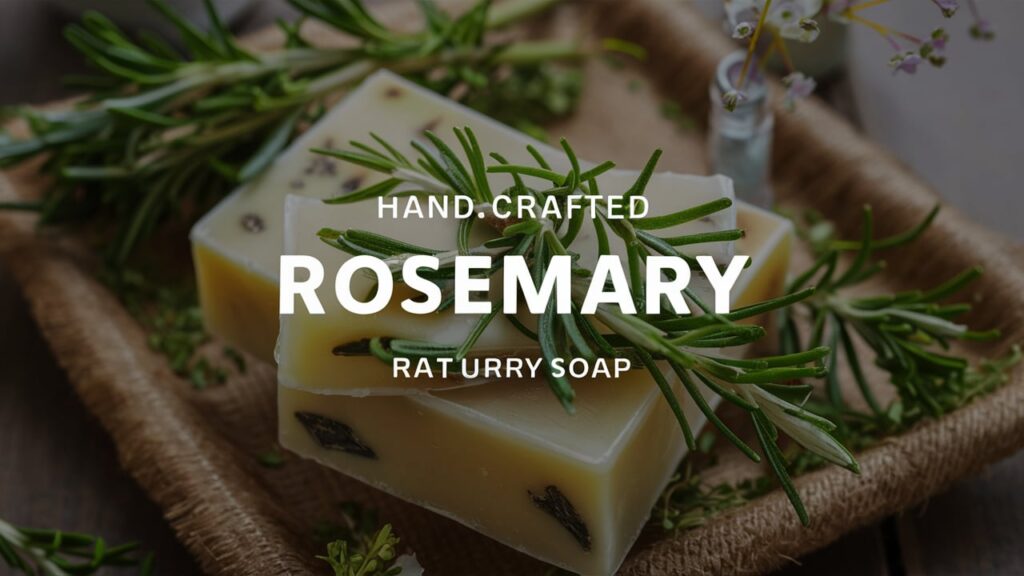- Rosemary soap, made with rosemary essential oil or leaves, has antioxidant properties
- The soap may help fight aging signs and soothe irritation.
- Rosemary soap also has antimicrobial and anti-inflammatory effects
- It promotes circulation and delivers an invigorating aroma beneficial for concentration
Rosemary soap benefits
Rosemary soap is a type of soap infused with rosemary essential oil or sometimes even dried rosemary leaves. The essential oil gives the soap its characteristic invigorating, woody scent.
The antioxidant properties of rosemary soap offer a variety of benefits for your skin and hair. Organic rose for skin can help control oil, potentially soothing irritation and promoting scalp health.
Some people even find the scent invigorating and uplifting.
Here are some of the main rose benefits for skin;
Rosemary’s Natural Properties
Rosemary contains compounds with antioxidant properties, particularly carnosic acid and rosmarinic acid.
When used in soap, rosemary extract potentially imparts antioxidant benefits to the skin. The antioxidants in rosemary help fight free radicals, unstable molecules that contribute to signs of aging.
Research on the topical application of rosemary extract for its antioxidant effects on the skin is ongoing. While there’s some evidence, more studies are needed. Exploring the skin benefits of rosemary soap can provide valuable insights into its effectiveness.
Soap Secrets: Why Homemade Soaps Are Your Skin’s New Best Friend
Antimicrobial Benefits
Rosemary soap may offer antimicrobial benefits due to rosemary essential oil. The oil contains compounds like carnosol and camphor, which have been shown to fight bacteria and fungi.
In laboratory studies, rosemary oil has demonstrated effectiveness against various bacteria, including Staphylococcus aureus and E. coli.
The soap-making process itself impacts the potency of the oil’s antimicrobial properties. While rosemary soap might help reduce bacteria on the skin, it shouldn’t be solely relied upon for complete disinfection.
Anti-inflammatory Effects
Rosemary contains compounds that exhibit anti-inflammatory properties in lab studies. These compounds may help reduce inflammation by inhibiting the production of inflammatory molecules.
When incorporated into soap, rosemary soap provides an added layer of skin protection.
While research suggests rosemary’s anti-inflammatory effects, most studies focus on concentrated rosemary oil. There’s a lack of robust research specifically on rosemary soap for sensitive skin and its ability to reduce inflammation on the skin.
Enhanced Circulation
Rosemary soap offers circulation benefits. The mechanism isn’t as straightforward as other potential effects. Rosemary essential oil, a key ingredient in the soap, contains compounds like camphor and cineole that stimulate blood flow.
Aromatherapy Benefits
Rosemary soap provides aromatherapy benefits during your shower or bath. Rosemary essential oil, commonly used in soap, has a fresh, invigorating scent known for its stimulating properties.
The stimulating fragrance of rosemary may help improve concentration and mental clarity. This is particularly beneficial in the morning shower to jumpstart your day.
The herbaceous scent creates a sense of peace and reduces tension.
The intensity of the aromatherapy experience varies depending on the amount and quality of rosemary essential oil used in the soap. Individual responses to scents differ. Some people use rosemary soap for hair to stimulate hair growth and nourish their scalp.
Dermatologist insights
According to dermatologists, rosemary is packed with antioxidants, anti-inflammatory properties, and essential nutrients for skincare, making it an effective rosemary soap for acne treatment.
Benefits for skin include improved texture, fighting acne, acting as a toner, and anti-aging properties.
DIY rosemary oil recipe requires fresh leaves and a carrier oil like olive, coconut, or jojoba oil.
https://www.youtube.com/watch?v=9wbX55gxKK8
User reviews, discussions, and experiences
Users widely praise Rosemary oil for its benefits for skin and hair health. Actual user experiences highlight its effectiveness in improving hair growth and skin health, particularly when paired with rosemary soap for oily skin. However, some users report skin irritation and other side effects.
Many users report positive experiences with rosemary oil, which has antimicrobial properties, in reducing dandruff and scalp irritation.
Users mention improvements in hair growth and thickness. Others compare its effectiveness to minoxidil, a common hair growth treatment ➎.
Reviews highlight that while rosemary oil is beneficial, it may cause skin irritation in sensitive individuals ➌.
Frequently Asked Questions
What are the main benefits of rosemary soap?
Rosemary soap offers numerous benefits, including antibacterial and antifungal properties, improved circulation, and relief from muscle pain. It also helps reduce acne, promotes a healthy scalp, and provides a refreshing, invigorating scent.
Is organic rosemary soap suitable for all skin types?
Yes, rosemary soap for skin rejuvenation is generally suitable for all skin types. Its natural ingredients make it gentle enough for sensitive skin, while its antibacterial properties help people with oily or acne-prone skin.
Can homemade rosemary soap help with acne?
Absolutely. Rosemary soap has antimicrobial and anti-inflammatory properties that help reduce acne by cleansing the skin and preventing the growth of acne-causing bacteria.
Does rosemary soap help with dry skin?
Yes, rosemary soap helps with dry skin. It contains natural oils that moisturize the skin, leaving it soft and hydrated without irritating.
Can I use rosemary soap on my hair?
Yes, rosemary soap can be used on hair. Its ability to improve circulation helps promote a healthy scalp, reduce dandruff, and stimulate hair growth.
If you’re looking for rosemary soap recipes, experiment with different ingredients to create your unique formula.
Is rosemary soap for eczema a good option?
Yes, rosemary soap is safe for sensitive skin. However, doing a patch test first is a good idea to ensure you don’t have any adverse reactions.
What does rosemary soap smell like?
Rosemary soap has a fresh, herbal scent that is invigorating and refreshing. It’s described as a blend of pine, mint, and eucalyptus.
Can rosemary soap help with muscle pain?
Yes, rosemary soap helps with muscle pain. Its natural anti-inflammatory properties relieve soreness and tension during a bath or shower.
Is rosemary soap effective against body odor?
Yes, rosemary soap is effective against body odor. Its antibacterial properties help eliminate odor-causing bacteria, leaving you fresh and clean.
How often to use rosemary soap?
Rosemary soap can be used daily. Its gentle formulation makes it suitable for regular use without causing dryness or irritation.

I’m a devoted organic skincare enthusiast, passionate about the natural, wholesome goodness that organic products bring to our skin.
Organic skincare isn’t just a hobby for me—it’s a lifestyle. Every product I use, recommend, and write about has been carefully chosen for its purity and effectiveness. Everything I write about is backed by scientific studies, dermatologists’ opinions, and user experiences.
I also excel at tackling skincare challenges with innovative, organic solutions.


